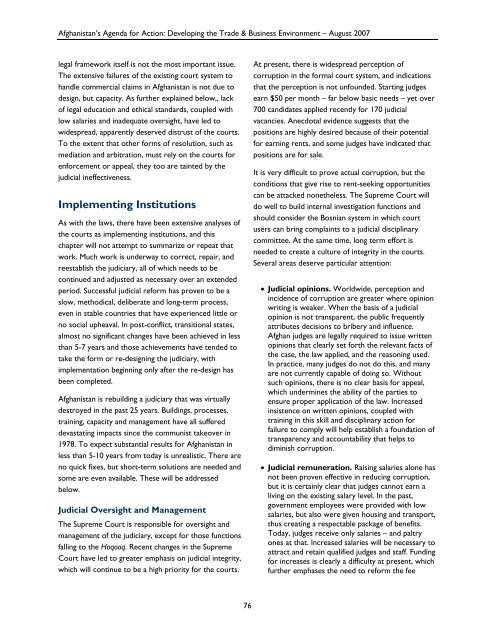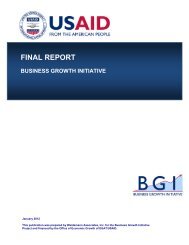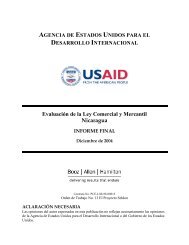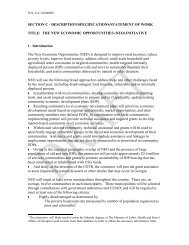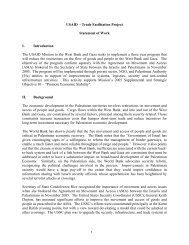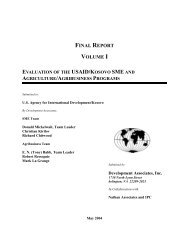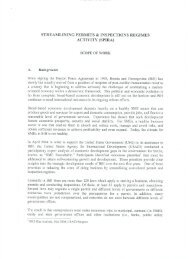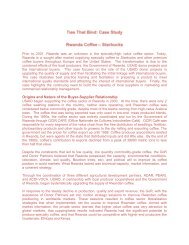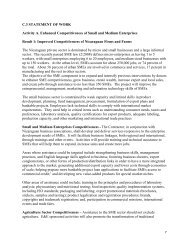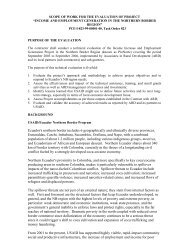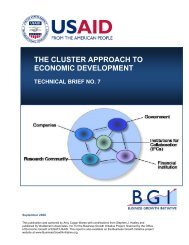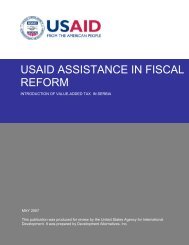Afghanistan's Agenda for Action - Economic Growth - usaid
Afghanistan's Agenda for Action - Economic Growth - usaid
Afghanistan's Agenda for Action - Economic Growth - usaid
Create successful ePaper yourself
Turn your PDF publications into a flip-book with our unique Google optimized e-Paper software.
Afghanistan’s <strong>Agenda</strong> <strong>for</strong> <strong>Action</strong>: Developing the Trade & Business Environment – August 2007legal framework itself is not the most important issue.The extensive failures of the existing court system tohandle commercial claims in Afghanistan is not due todesign, but capacity. As further explained below,, lackof legal education and ethical standards, coupled withlow salaries and inadequate oversight, have led towidespread, apparently deserved distrust of the courts.To the extent that other <strong>for</strong>ms of resolution, such asmediation and arbitration, must rely on the courts <strong>for</strong>en<strong>for</strong>cement or appeal, they too are tainted by thejudicial ineffectiveness.Implementing InstitutionsAs with the laws, there have been extensive analyses ofthe courts as implementing institutions, and thischapter will not attempt to summarize or repeat thatwork. Much work is underway to correct, repair, andreestablish the judiciary, all of which needs to becontinued and adjusted as necessary over an extendedperiod. Successful judicial re<strong>for</strong>m has proven to be aslow, methodical, deliberate and long-term process,even in stable countries that have experienced little orno social upheaval. In post-conflict, transitional states,almost no significant changes have been achieved in lessthan 5-7 years and those achievements have tended totake the <strong>for</strong>m or re-designing the judiciary, withimplementation beginning only after the re-design hasbeen completed.Afghanistan is rebuilding a judiciary that was virtuallydestroyed in the past 25 years. Buildings, processes,training, capacity and management have all suffereddevastating impacts since the communist takeover in1978. To expect substantial results <strong>for</strong> Afghanistan inless than 5-10 years from today is unrealistic. There areno quick fixes, but short-term solutions are needed andsome are even available. These will be addressedbelow.Judicial Oversight and ManagementThe Supreme Court is responsible <strong>for</strong> oversight andmanagement of the judiciary, except <strong>for</strong> those functionsfalling to the Hoqooq. Recent changes in the SupremeCourt have led to greater emphasis on judicial integrity,which will continue to be a high priority <strong>for</strong> the courts.At present, there is widespread perception ofcorruption in the <strong>for</strong>mal court system, and indicationsthat the perception is not unfounded. Starting judgesearn $50 per month – far below basic needs – yet over700 candidates applied recently <strong>for</strong> 170 judicialvacancies. Anecdotal evidence suggests that thepositions are highly desired because of their potential<strong>for</strong> earning rents, and some judges have indicated thatpositions are <strong>for</strong> sale.It is very difficult to prove actual corruption, but theconditions that give rise to rent-seeking opportunitiescan be attacked nonetheless. The Supreme Court willdo well to build internal investigation functions andshould consider the Bosnian system in which courtusers can bring complaints to a judicial disciplinarycommittee. At the same time, long term ef<strong>for</strong>t isneeded to create a culture of integrity in the courts.Several areas deserve particular attention:• Judicial opinions. Worldwide, perception andincidence of corruption are greater where opinionwriting is weaker. When the basis of a judicialopinion is not transparent, the public frequentlyattributes decisions to bribery and influence.Afghan judges are legally required to issue writtenopinions that clearly set <strong>for</strong>th the relevant facts ofthe case, the law applied, and the reasoning used.In practice, many judges do not do this, and manyare not currently capable of doing so. Withoutsuch opinions, there is no clear basis <strong>for</strong> appeal,which undermines the ability of the parties toensure proper application of the law. Increasedinsistence on written opinions, coupled withtraining in this skill and disciplinary action <strong>for</strong>failure to comply will help establish a foundation oftransparency and accountability that helps todiminish corruption.• Judicial remuneration. Raising salaries alone hasnot been proven effective in reducing corruption,but it is certainly clear that judges cannot earn aliving on the existing salary level. In the past,government employees were provided with lowsalaries, but also were given housing and transport,thus creating a respectable package of benefits.Today, judges receive only salaries – and paltryones at that. Increased salaries will be necessary toattract and retain qualified judges and staff. Funding<strong>for</strong> increases is clearly a difficulty at present, whichfurther emphases the need to re<strong>for</strong>m the fee76


